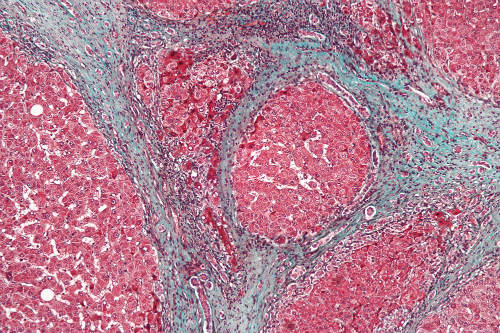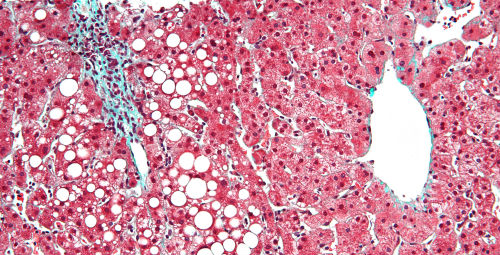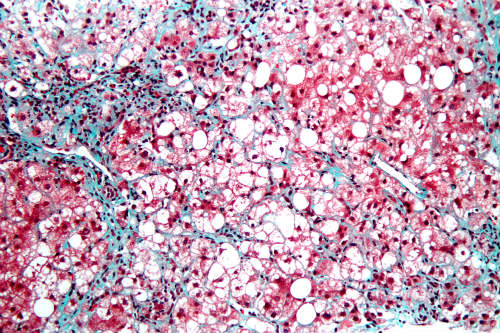- Coffee consumption has been associated with reduced frequency of liver disease.
- Total caffeine intake was not associated with prevalence or hepatic fibrosis of nonalcoholic fatty liver disease.
- Regular coffee caffeine consumption may significantly reduce hepatic fibrosis in patients with nonalcoholic fatty liver disease.
- Coffee consumption can reduce the severity of fibrosis and may contribute to the repair of liver tissue.
- Coffee caffeine is associated with a significant reduction in risk of fibrosis among patients with nonalcoholic steatohepatitis.
Coffee caffeine consumption has been found reduce the frequency and severity of liver disease and to benefit patients with a variety of liver disease including hepatitis C, nonalcoholic fatty liver disease (NAFLD), and nonalcoholic steatohepatitis according to a number of recent studies and systematic reviews. Coffee caffeine (CC) consumption reduces the prevalence and severity of hepatic fibrosis associated with these diseases, creating an environment within which the liver tissue can repair. Physicians now have additional reason to suggest that patients drink coffee.
Fibrosis disorganizes the architecture of the liver anatomically and functionally. Moderately severe fibrosis has been found to at least partially reversible in some cases. The liver can then begin to resume a normal structure. The degree of fibrosis therefore constitutes an important prognostic parameter. The extent of the fibrosis is one factor affecting the diagnosis and decisions concerning therapy, and a criterion for tracking the progress of the illness and the effectiveness of therapy.
This online calculator can help clinicians noninvasively identify hepatic fibrosis in patients with NAFLD. The calculator was first published in an article in Hepatology in 2007.

Therapeutic Advances in Gastroenterology 2016
This recent systematic review reports that that regular coffee consumption significantly reduces rates and severity of hepatic fibrosis in patients with liver disease. Hepatic fibrosis can be reversed and the liver can resume a normal structure in some cases. The degree of fibrosis is an important prognostic parameter. Coffee consumption can reduce the severity of fibrosis and may contribute to the repair of liver tissue.
The meta-analysis included 4 cross-sectional and 2 case-control studies with a total of 20,064 patients. Among these studies, 3 with 18,990 subjects in all were included in the analysis in order to assess the prevalence of NAFLD. The other 3 studies, including 1074 patients, were designed to evaluate hepatic fibrosis.
Total caffeine consumption (mg/day) was not significantly associated with either the prevalence [pooled mean difference (MD) 2.36; 95% confidence interval (CI) -35.92 to 40.64] or hepatic fibrosis (higher versus lower stages; pooled MD -39.95; 95% CI -132.72 to 52.82) of NAFLD. Subgroup analyses stratified by study designs and locations were also not significant. However, after stratifying by type of caffeine intake, regular coffee caffeine intake (mg/day) was significantly associated with reduced hepatic fibrosis of NAFLD (pooled MD -91.35; 95% CI -139.42 to -43.27; n = 2 studies).
“Total caffeine intake is not associated with the prevalence or hepatic fibrosis of NAFLD, regular coffee caffeine consumption may significantly reduce hepatic fibrosis in patients with NAFLD,” the reviewers concluded.

Hepatology 2012
Coffee caffeine consumption (CC) is associated with reduced hepatic fibrosis in patients with chronic liver diseases, such as hepatitis C. This study examined the correlation of CC on the development of NAFLD. Patients in this study had previously been involved an NAFLD prevalence study. The study also included patients with NASH who had participated in a study at the Brooke Army Medical Center Hepatology clinic. A validated questionnaire for CC was used to assess the relationship between CC among 4vgroups: ultrasound negative (controls), bland steatosis/not-NASH, NASH stage 0-1, and NASH stage 2-4.
In all, 306 patients responded to the CC questionnaire. Patients with bland steatosis/not-NASH were compared to those with NASH stage 0-1. A statistically significant difference in CC was identified between the two groups (P = 0.005). A similarly significant difference was reported among patients with NASH stage 0-1 to those with NASH stage 2-4 (P=0.016). “Coffee CC is associated with a significant reduction in risk of fibrosis among NASH patients.”

Hepatology 2010
Coffee consumption has been associated with reduced frequency of liver disease. However, at the time this study was published, it was unclear whether the effect was due to coffee or caffeine and whether CC would affect the severity or prevalence of hepatic fibrosis specifically.
Patients undergoing liver biopsy completed a detailed caffeine questionnaire on 3 occasions over a 6-month period. Caffeine intake was compared between patients with mild and advanced liver fibrosis (bridging fibrosis/cirrhosis). Logistic regression was used to evaluate the association between caffeine consumption and hepatic fibrosis.
The study included 177 patients (99 men, 104 white, 121 with chronic hepatitis C virus [HCV] infection) who were undergoing liver biopsy completed the caffeine questionnaire on ≤3 occasions. Results from repeated questionnaires were consistent, the authors noted. Daily caffeine consumption above the 75t) percentile for the cohort (308 mg or approximately 2.25 cups of coffee equivalents) was associated with reduced liver fibrosis (odds ratio [OR], 0.33; 95% confidence interval [CI], 0.14-0.80; P=0.015).
The protective association persisted after controlling for age, sex, race, liver disease, body mass index, and alcohol intake in all patients (OR, 0.25; 95% CI, 0.09-0.67; P=0.006), as well as the subset of patients with HCV infection (OR, 0.19; 95% CI, 0.05-0.66; P=0.009). Importantly, “despite a modest trend, consumption of caffeine from sources other than coffee or of decaffeinated coffee was not associated with reduced liver fibrosis,” the authors noted
“A reliable tool for measurement of caffeine consumption demonstrated that caffeine consumption, particularly from regular coffee, above a threshold of approximately 2 coffee-cup equivalents per day, was associated with less severe hepatic fibrosis,” they concluded.
